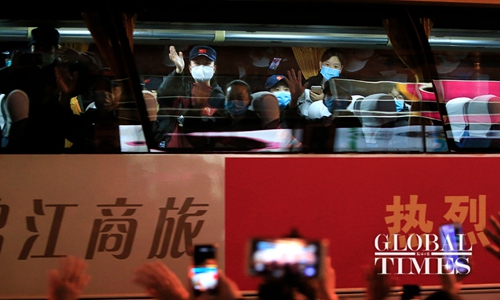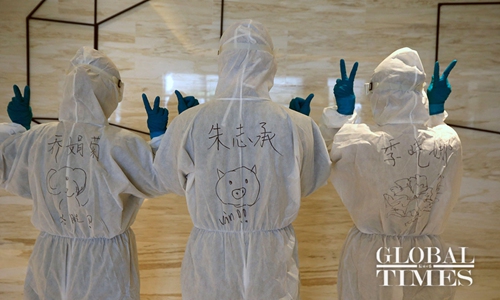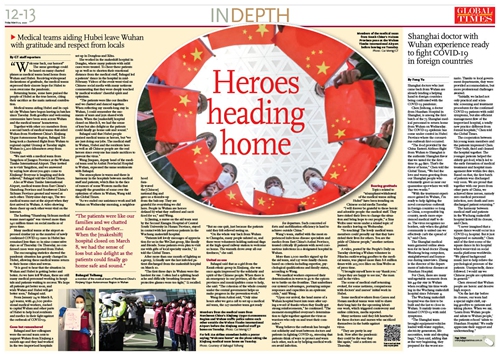
Photo: Yang Hui/GT
Shanghai doctors who just came back from Wuhan are already lending a helping hand to foreign countries being confronted with the COVID-19 pandemic.Chen Jinhong, a doctor from Huashan Hospital in Shanghai, is among the first batch of the 73 Shanghai medical personnel to return home from Wuhan on Wednesday. The COVID-19 epidemic has come under control in Hubei Province where the coronavirus outbreak first occurred.
"The food provided by the China Eastern Airlines flight from Wuhan to Shanghai is the authentic Shanghai flavor that we tasted for the first time in 44 days. That's the flavor of home," Chen told the Global Times, "We feel the love and warm greeting from our Shanghai people who voluntarily greet us near our quarantine spot where we will stay two weeks."
"With the treatment experiences gained in Wuhan, I'm ready to help fighting the novel coronavirus outbreak in foreign countries so long as China, a responsible big country, needs more experienced medical staff to do so. The virus recognizes no borders, only when the global community is united can we effectively curb the spread of it," said Chen.
The Shanghai medical team garnered online attention for its head doctor Zhang Wenhong being outspoken, straightforward and humorous during interviews. Zhang is the director of the department of infectious diseases at Huashan Hospital.
For Chen, there are many unforgettable moments from his 44-day stay in Wuhan when recalling his time working in the Wuchang makeshift hospital since February 4.

In a centralized quarantine site near Shanghai Hongqiao International Airport, medical personnel deployed by Shanghai Changning District Health Commission, have been working round the clock, despite risks of infection, for half a month, assisting quarantined inbound travelers and helping to identify possible COVID19 carriers. Photo: Yang Hui/GT
The Wuchang makeshift hospital was the first to be built and the last to close in Wuhan. It mainly treats confirmed COVID-19 with mild symptoms."The Shanghai team brought equipment vehicles loaded with water supplies, electricity generators, life necessities, tents and sleeping bags," Chen said, adding that at the very beginning, they prepared for the worst scenario. Thanks to local government departments, they were provided accommodation, but more professional challenges awaited.
"Initially, we lacked not only practical and scientific screening and treatment procedures for the confirmed COVID-19 patients with mild symptoms, but also efficient management flow of the improvised hospital, a totally new practice different from formal hospitals," Chen told the Global Times.
The cooperation between his young team members and the patients impressed Chen. "They built, fixed and cleaned the hospital together. The younger patients helped the elderly get food, which led to the early formation of medical treatment and hospital management flow within five days. Based on that, the first batch of patients was discharged very soon. We are proud that together with our peers from other parts of China, we achieved three zeroes, namely zero medical personnel infection, zero death and zero discharged patient returning."
The harmony between medical staff and patients in the Wuchang makeshift hospital lasted till its closure, said Chen.
"I never imagined that a square dance would occur in a COVID-19 hospital. But it just happened so naturally," Chen said of the first scene of the square dance in his hospital which went viral on social media platforms worldwide. "We played background music just to help relieve the psychological pressure of the patients. Unexpectedly, dance followed. I would say we Chinese people are optimistic in general."
Chen stressed that Wuhan people are heroic and deserve high respect.
"On the last day before its closure, our team had a special night shift, saying goodbye to patients and taking photos. When we say, 'Learn from Wuhan people and salute to Wuhan people,' the patients echoed 'salute to Huashan Hospital.' We really appreciate their support and understanding."

gt


